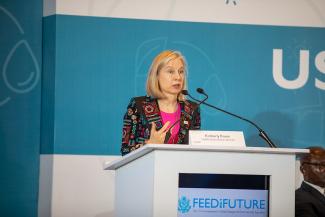• Honorable Minister of Finance; Hon Dr. Amin Adam
• Representatives from Government of Ghana agencies;
• Private sector and development partners;
• Members of the media;
• Distinguished Ladies and gentlemen
• All protocols observed.
I am delighted to be here to represent the United States Government through the U.S. Agency for International Development–USAID–to inaugurate the Climate Finance Conference. This conference is hosted by USAID as part of our Feed the Future activities. Today, we come together to address the pressing issue of climate change and its profound impacts on agriculture, food security, and income here in Ghana.
Climate change is a global crisis. As temperatures and sea levels rise, people around the world are increasingly seeing heat waves, droughts, floods, cyclones, and wildfires that upend their lives. Seventeen of the world’s 20 most climate-vulnerable countries are in Africa. Climate change is already a very real part of people’s lives.
Climate change also disproportionately impacts people living in poverty, and those who are marginalized. We are aware of these impacts. Shifting rainfall patterns, rising temperatures, and extreme weather conditions pose significant threats to Ghana’s agricultural productivity, food security, jobs and livelihoods. Responding to the climate crisis will protect valuable natural resources. It can also create opportunities for the rural poor to adapt and even benefit from new approaches and economic opportunities.
Ghana is already a leader in combating climate change. Ghana is the second country in Africa to receive payments from the World Bank trust fund for reducing emissions from deforestation and forest degradation. Ghana has committed to 31 mitigation and adaptation actions across seven economic sectors in its Nationally Determined Contributions, or NDCs. The NDCs have been instrumental in outlining Ghana’s comprehensive framework for climate action.
Yet, the resources required to implement these goals remain a critical concern. The efforts to access and mobilize climate finance are complicated but far from impossible. According to the United Nations Framework Convention on Climate Change, climate finance flows in Ghana averaged only 5-9 percent of the required investment, highlighting the pressing need to bolster climate finance to achieve Ghana’s NDCs.
At USAID, our climate strategy is guided by an overarching goal: to advance equitable and ambitious actions to confront the climate crisis. The strategy aims to confront the climate crisis through two main objectives:
1. The first is to take direct action by prioritizing urgent climate change mitigation and adaptation projects to maximize positive impact.
2. The second is through systems change, that is, we partner with the Government of Ghana and the private sector to transform food systems for resilience and sustainability.
This conference provides a platform to advance these objectives. The theme, "Climate financing in Ghana: Mobilizing resources for mitigation and adaptation," highlights the urgent need to mobilize finance to address the escalating impact of climate change.
Ghana's economy relies heavily on agriculture, which makes it vulnerable to climate change. Building resilience is crucial for food security, poverty reduction, and economic growth, especially for the country's growing population. To improve Ghana's agriculture and food systems, we need new funding models and partnerships to attract investments in climate-friendly solutions.
Let me share a story about how one of our activities supported a farmer named Benjamin in the upper west region of Ghana. USAID helped Benjamin gain access to finance to implement a solar pumping irrigation system using a hand-dug well near his farm. As we are in the middle of the dry season, I think all of us can understand just how important irrigation is, and how important it will be for climate resilient agriculture. Now, Benjamin does not have to rely on erratic rainfall patterns to grow his crops. AND, notably, he can cultivate crops that are known to thrive only in the southern part of the country such as plantains, bananas, and oil palm. This is a clear example of how access to finance and the application of technology can make our smallholder farmers resilient to the impacts of climate change. These changes can also be transformative for the country.
I’ll end by noting that through the initiatives USAID supports here in Ghana are already working to address credit constraints and climate change effects in Ghana’s agriculture sector. For example, the Mobilizing Finance in Agriculture activity facilitates access to climate capital. The Africa Trade and Investment activity supports private sector participation in climate mitigation and adaptation. And finally, the Policy LINK activity strengthens agriculture and climate change policy systems. These partnerships are crucial for driving climate resilience and economic growth. USAID’s bottom line goal is to help farmers grow more food, even in the face of longer droughts, changing rain patterns, and more intense heat, flooding, and pests. All of our efforts can help advance this goal. During the conference I urge all participants to share information and lessons on effective climate resilience.
Together we can unlock climate capital to build a more climate resilient agricultural sector in Ghana.
Thank you.

Yooku Ata-Bedu
